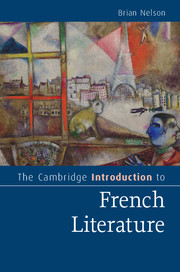Book contents
- Frontmatter
- Dedication
- Contents
- Preface
- Acknowledgements
- Chronology
- 1 Villon: a dying man
- 2 Rabelais: the uses of laughter
- 3 Montaigne: self-portrait
- 4 Corneille: heroes and kings
- 5 Racine: in the labyrinth
- 6 Molière: new forms of comedy
- 7 La Fontaine: the power of fables/fables of power
- 8 Madame de Lafayette: the birth of the modern novel
- 9 Voltaire: the case for tolerance
- 10 Rousseau: man of feeling
- 11 Diderot: the enlightened sceptic
- 12 Laclos: dangerous liaisons
- 13 Stendhal: the pursuit of happiness
- 14 Balzac: ‘All is true’
- 15 Hugo: the divine stenographer
- 16 Baudelaire: the streets of Paris
- 17 Flaubert: the narrator vanishes
- 18 Zola: the poetry of the real
- 19 Huysmans: against nature
- 20 Mallarmé: the magic of words
- 21 Rimbaud: somebody else
- 22 Proust: the self, time and art
- 23 Jarry: the art of provocation
- 24 Apollinaire: impresario of the new
- 25 Breton … Company: Surrealism
- 26 Céline: night journey
- 27 Sartre: writing in the world
- 28 Camus: a moral voice
- 29 Beckett: filling the silence
- 30 French literature into the twenty-first century
- Notes
- Further reading
- Index of authors and titles
- Index of genres, movements and concepts
- Cambridge Introductions to …
- References
3 - Montaigne: self-portrait
Published online by Cambridge University Press: 05 July 2015
- Frontmatter
- Dedication
- Contents
- Preface
- Acknowledgements
- Chronology
- 1 Villon: a dying man
- 2 Rabelais: the uses of laughter
- 3 Montaigne: self-portrait
- 4 Corneille: heroes and kings
- 5 Racine: in the labyrinth
- 6 Molière: new forms of comedy
- 7 La Fontaine: the power of fables/fables of power
- 8 Madame de Lafayette: the birth of the modern novel
- 9 Voltaire: the case for tolerance
- 10 Rousseau: man of feeling
- 11 Diderot: the enlightened sceptic
- 12 Laclos: dangerous liaisons
- 13 Stendhal: the pursuit of happiness
- 14 Balzac: ‘All is true’
- 15 Hugo: the divine stenographer
- 16 Baudelaire: the streets of Paris
- 17 Flaubert: the narrator vanishes
- 18 Zola: the poetry of the real
- 19 Huysmans: against nature
- 20 Mallarmé: the magic of words
- 21 Rimbaud: somebody else
- 22 Proust: the self, time and art
- 23 Jarry: the art of provocation
- 24 Apollinaire: impresario of the new
- 25 Breton … Company: Surrealism
- 26 Céline: night journey
- 27 Sartre: writing in the world
- 28 Camus: a moral voice
- 29 Beckett: filling the silence
- 30 French literature into the twenty-first century
- Notes
- Further reading
- Index of authors and titles
- Index of genres, movements and concepts
- Cambridge Introductions to …
- References
Summary
Every man bears the entire form of the human condition.
– Montaigne, ‘On Repenting’In 1570 Michel de Montaigne (1533–92), suffering increasingly from melancholy, resigned as a magistrate in the high court of Bordeaux to spend more time on his estate in the Périgord, reflecting, reading in his tower library and writing his Essays. The death in 1563 of his beloved friend étienne de La Boétie had deeply affected him. His father and younger brother had died several years later, and his children were also dying (only one lived to grow up). Montaigne felt that he needed to prepare himself for death spiritually, and his morbidity was only increased by his reading in classical philosophy – the Stoics, Epicureans and Sceptics. Moreover, death was everywhere in the world around him in the shape of the Wars of Religion that marked the second half of the sixteenth century. The conflict between Catholics and Protestants, following the Reformation, took a particularly violent form in France. Soon after Montaigne began his Essays, there occurred the St Bartholomew's Day Massacre, in 1572 – a coordinated series of assassinations of prominent Huguenot (Protestant) figures, followed by a wave of Roman Catholic mob violence. When Montaigne died, twenty years later, Catholics and Protestants were still killing each other. There were atrocities on both sides, with attendant disorder, famine and outbreaks of plague. The high ideals of the early Renaissance, with its belief in the potential of human nature and of the individual human being, ‘dissolved’, in Sarah Bakewell's words, ‘into violence, cruelty and extremist theology’ (How to Live, p. 51).
Montaigne took up his pen as a form of therapy, to cure himself of his depression. His desire was to see himself and the world in perspective. To begin with, however, his solitary leisure produced not orderly reflection, but ‘chimeras and fantastic monsters’. He became increasingly aware of the unruliness of his own mind, the inconsistency and changeability of his feelings and dispositions.
- Type
- Chapter
- Information
- The Cambridge Introduction to French Literature , pp. 17 - 24Publisher: Cambridge University PressPrint publication year: 2015

